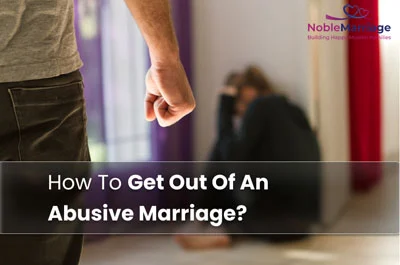If you find yourself trapped in an abusive marriage, escaping may seem impossible, but remember, you are not alone in this struggle. There are steps you can take to protect yourself and reclaim your life.
Recognizing the signs of abuse, seeking advice, and understanding the options available can empower individuals to prioritize their well-being and safety. By understanding your rights, seeking support, and prioritizing your well-being, you can begin the journey towards a brighter future.
Your safety and happiness are important, and with proper guidance and determination, you can break free from the chains of abuse. Throughout this post, we will explore six essential ways to navigate the process of leaving an abusive marriage while upholding Islamic principles.
How to Get Out of an Abusive Marriage in Islam?
Muslim Life Partner?
If you find yourself in an abusive marriage and follow Islam, understanding your rights and obligations as a spouse is crucial. You can follow these procedures:

- Understand your rights and duties as a spouse
- Prioritize your emotional well-being
- Seek religious guidance and support
- Build a support network
- Consider Khula as a last option
- Trust in Allah’s guidance and mercy
Understand Your Rights and Duties as a Spouse
To navigate the challenging situation of an abusive marriage in Islam, educate yourself on your rights and duties as a spouse. Islam upholds the sanctity of marriage but also prioritizes justice and protection from harm.
Seek guidance from knowledgeable individuals to understand your Islamic rights and responsibilities in such circumstances. Remember, enduring abuse isn’t a requirement in Islam, and seeking freedom from oppression isn’t only permissible but a moral obligation.
Prioritize Your Emotional Well-Being
Prioritizing your emotional well-being is crucial when seeking to get out of an abusive marriage in Islam. Leaving such a relationship can be emotionally challenging, especially with the potential long-term effects, mainly when children are involved.

Acknowledge the emotional pain and manipulation caused by abuse and take steps to prioritize your well-being and that of your children. Seeking therapy or counseling can help address the trauma and rebuild your self-esteem.
Seek Religious Guidance and Support
When considering how to get out of an emotionally abusive marriage in Islam, seeking religious guidance and support is a crucial initial step. Consulting with a knowledgeable imam or respected figure within the community can offer valuable insights into Islamic perspectives regarding divorce separation.
These individuals can guide the religious aspects of your situation and help you navigate the process of seeking a way out of the abusive marriage.
Build a Support Network
Building a strong support network is essential when navigating to extricate yourself from an abusive marriage in Islam. Lean on trusted individuals such as friends, family, or community members who can provide emotional support, guidance, and practical assistance.

Surrounding yourself with people who prioritize your safety and well-being can help you feel more secure and empowered during this challenging time. These individuals can offer a listening ear, help you explore your options, and stand by you as you make decisions about your future.
Consider Khula as a Last Option
Consider Khula as a potential option when seeking to exit an abusive marriage in Islam, especially if other methods of reconciliation have proven unsuccessful.
Khula is a process in Islamic law that allows a woman to seek a divorce from her husband by returning the mahr (dowry) or providing compensation. If the marriage has become abusive and efforts to reconcile have failed, Khula may be a viable option to initiate separation.
Trust in Allah’s Guidance and Mercy
To navigate the process of getting out of an abusive marriage in Islam, it’s essential to trust in Allah’s guidance and mercy as you seek safety and well-being. Turn to prayer, seek support from knowledgeable individuals, and rely on your faith for strength during this challenging time.
Remember that seeking safety and well-being isn’t only permissible but encouraged in Islam. Allah’s mercy is always available to those who seek His help. You can find the courage and resilience to take the necessary steps towards a better and healthier future by placing your trust in Allah.
How to Recognize the Signs of Abuse in Marriage?
Recognizing the Signs of Abuse is crucial in ensuring the well-being and safety of individuals, especially in the context of marriage. Here are some points to identify the signs of abuse:

Demeaning Behavior
Demeaning behavior involves actions or words that belittle, degrade, or humiliate the victim. In an abusive relationship, the perpetrator may constantly criticize, mock, or insult the victim, eroding their self-esteem and confidence.
This behavior may manifest as name-calling, ridicule, or derogatory language toward the victim. The Prophet Muhammad emphasized the importance of kind and respectful behavior in all relationships and condemned actions that cause harm or distress to others.
Shouting All Times
Constant shouting or yelling for irrelevant reasons in a relationship can create a hostile and intimidating environment for the victim. Verbal abuse, including shouting or screaming, is a common tactic used by abusers to assert power and control over their victims.

The Prophet (PBUH) advised against harsh and abusive language, emphasizing the importance of speaking kindly and respectfully to others. An environment filled with continuous shouting can lead to emotional distress, fear, and anxiety for the victim, impacting their mental and emotional well-being.
Isolation & Blaming
Abusers often isolate their victims from friends, family, or support systems to maintain control over them and limit outside influences. Isolation tactics may include monitoring or restricting communication, controlling social interactions, or preventing the victim from seeking help.
Blaming is a common manipulation tactic used by abusers to shift responsibility for their actions onto the victim, making them feel guilty or at fault for the abuse. In Islam, mutual respect, trust, and support are essential components of a healthy relationship, and blaming or isolating one’s partner goes against these principles.
Physical Assault
Physical assault involves any form of physical violence or harm inflicted on the victim by the abuser. This can include hitting, slapping, punching, kicking, or any other act of physical aggression that causes pain or injury.
Islam prohibits the use of violence and emphasizes the sanctity of life and the protection of individuals from harm. The Prophet (PBUH) condemned physical abuse and advised against aggression or harm towards others, promoting peaceful and compassionate interactions.
How Do You Deal With a Cruel Wife?
Addressing the challenges posed by a cruel wife requires patience, understanding, and a commitment to open communication. Let your wife know that her behavior is causing you discomfort.
Be honest and transparent about how her actions are affecting you. Communicate the consequences of her continued cruelty and express that changes must occur for the relationship to improve.
Consider taking a break or separating with the agreement that reconciliation is possible once she makes a genuine effort to change her behavior and prioritize respect for herself and you. Encourage her to take the marriage seriously and respect Allah and Islam’s values.
Should I Divorce a Disrespectful Wife?
If you consistently face disrespect from your wife despite efforts to address the issue, it may be necessary to evaluate the possibility of divorce as a means of prioritizing your well-being and mental health.
Recognize that everyone deserves to be treated with respect in a marriage. While it’s understandable to try counseling to resolve underlying issues, if the disrespect persists and impacts your emotional well-being, consider ending the marriage.
Is It Better To Stay In a Toxic Marriage or Divorce?
Navigating a toxic marriage can be incredibly challenging, and understanding when to consider divorce is a crucial decision for your well-being.
While it’s advised to work on marital issues through counseling, communication improvements, and conflict resolution, some marriages reach a point where divorce becomes the best option for your mental and emotional health.
Staying in a toxic marriage can have detrimental effects on your overall well-being. Constant exposure to toxicity can lead to stress, anxiety, depression, and even physical health issues.
Prioritize your happiness and safety when making this decision. Divorce might be necessary to break free from a harmful situation and move towards a brighter future.
Fostering Faith and Empowerment: Strategies for Successfully Leaving an Abusive Marriage
Leaving an abusive marriage is a courageous and empowering decision that requires careful planning, support, and reliance on Islamic teachings.
By seeking religious guidance, considering Khula as an option, prioritizing well-being, and trusting in Allah’s guidance, individual Muslims can navigate the process of exiting an abusive marriage with faith and resilience.
Remember that you are not alone, and resources and support are available to help you through this challenging time. Trust in Allah’s plan and take steps towards a brighter and safer future for yourself.
- What Is a Split Wedding? - October 15, 2024
- How To Ask For Money Instead of Gifts For Wedding? - October 12, 2024
- What Is a Micro Wedding | Everything You Need To Know - October 1, 2024
